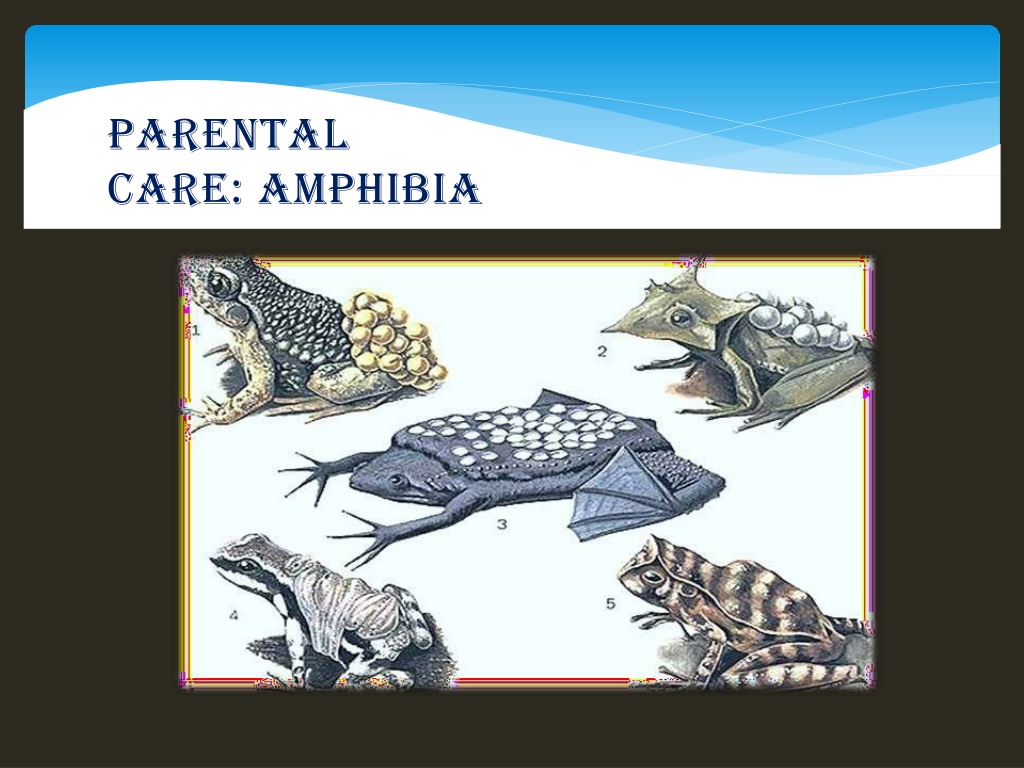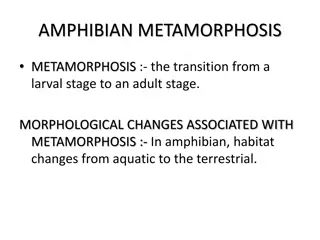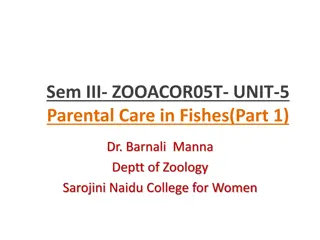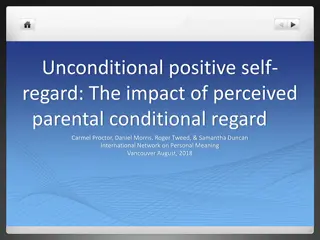Amphibian Parental Care and Protection Methods
Parental care in amphibians involves various strategies such as nest building, direct carrying of eggs, and protecting developing eggs in different ways like laying eggs on leaves, burrowing, or creating foam nests. These methods ensure the survival of amphibian species by providing a safe environment for the eggs and tadpoles to develop before emerging into the wild.
Download Presentation

Please find below an Image/Link to download the presentation.
The content on the website is provided AS IS for your information and personal use only. It may not be sold, licensed, or shared on other websites without obtaining consent from the author. Download presentation by click this link. If you encounter any issues during the download, it is possible that the publisher has removed the file from their server.
E N D
Presentation Transcript
PARENTAL CARE: AMPHIBIA
De Definition: This is a process by which parents give attention to the developing eggs so that they can lead independent life, thus ensuring the possibilities of the survival of the species.
PROTECTION BY PROTECTION BY NESTS, NURSERIES NURSERIESOR NESTS, OR SHELTERS SHELTERS Selection Selection of protected moist microhabitats on land. Many tropical frogsandtoadslayeggsonlandnearwater.Manytree frogs lay their eggs not on land but on leaves and branches over hanging water. E.g. Rhachophorus, Hylodes. Defending Defending eggs eggs or or territories territories-Males of green frog Rana clamitans and other species maintain territories and attacksmallintruderstodefendeggs.Maleor female even guards theeggs. of site site Many amphibians lay eggs in
Hylodeds sp Triton sp lay eggs undersurfaces of leaves overhanging on pond rain washes down to the water where metamorhosis takes palce Foam Foam nests nests Many amphibians convert copious mucous secretionsintonestsfortheiryoung. Mud MudNests Nests InBraziliantreefrogHylafabre,themale digs a little crater-like hole or nursery in mud in shallowwater,inwhich thefemalelayshereggs. Tree Tree nests nests The south American tree frogs Phyllomedusa hypochondrales,layseggsinafolded leafnestwithmarginsglued together by cloacal secretion.
DIRECT CARRYING BYPARENT in congo eel, Amphuima and Coiling around eggs - certaincaecilians,the femalelayslargeeggsinburrowsin damp soil and carefully guards them by coiling her body aroundthem untiltheyhatched. Transferring tadpoles to water some species ofsmall frogs in both tropical Africa and South America, the hatching tadpoles fasten themselves to the back of one of the parent with their suckerlikemouth andtransportedto water. Eggs glued to body Many amphibians, instead of remainingwith theeggs, carrythe eggsgluedto theirbody. Eg. Duskysalamender
Nest of gelatinous bag: 7.Salamandra sp lays eggs in gelatinous bags. 8.Shoot nest: Triton sp collects the shoot and lay eggs within the shoot and rain wash out the eggs. Parents are directly involved:Without structural modiications of te body: Eggs are carried on brood pouch within which eggs hatch into Tadeole. Alytes sp a mid wife toad the mal carries the egss on his back. Desmognathus sp the female carries the eggs mass tied down on her neck. Ichthyophis sp te female coils round the eggs underground within decomposed leaves.
Eggs in back pouches- In marsupial frogs or toads, the female carries the eggs on her back, either in an open oval depression, a closed pouch or in individual pockets. Viviparity Some anurans are ovoviviparous. They retain eggs in the oviducts and the females gives birth to living young.
With structural modification: Gastrotheca sp carries eggs in brood pouch, during breeding season by hormonal action formed on the back of the female. Cryptobranchus sp carried eggs in brood pouch later developed in belly. Pipa sp during amplexion the uterus of the female isverted and malepresses the egss into the brood pouches where they develop into tadepole larvae R.darwinni the tadepole develops within the vocal sac of male.
BENEFITS BENEFITS OF OF PARENTAL PARENTALCARE CARE It isimportant for survivalof young one. It improves offspring quality in away that leads to increasedoffspring survivaland reproduction in the future when parents are no longer associated with offspring.

















































